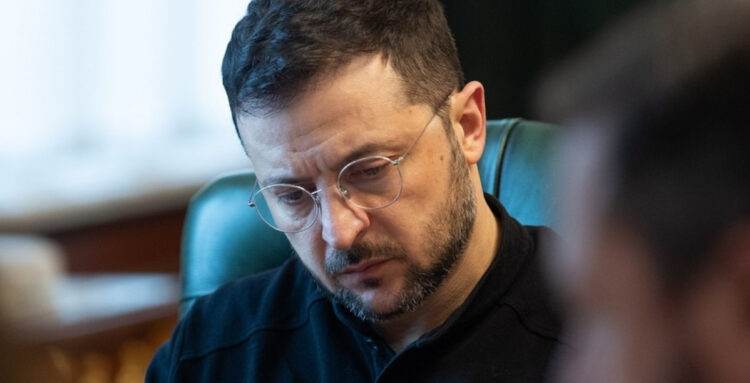Has Donald Trump finally got what he wanted from Volodymyr Zelenskyy?
The Ukrainian president is said to be so close to signing a deal giving the U.S. access to Ukraine’s critical minerals — something Washington has been pushing for as part of its conditions for ending the war with Russia.
This is a big turnaround for Zelensky, who recently said, “I defend Ukraine, I can’t sell our country.”
Trump pressures Zelensky into signing a deal
On Friday, Zelensky confirmed that Ukrainian and U.S. officials were finalizing an economic deal. Trump told reporters, “We’re signing an agreement, hopefully in the next fairly short period of time.”
The Wall Street Journal reported that the deal was nearly done and could be signed “within hours.”
During remarks at the Conservative Political Action Conference, the White House national security adviser Mike Waltz said, “Here’s the bottom line: President Zelenskyy is going to sign that deal, and you will see that in the very short term.”
Zelensky angered Trump during negotiations
Behind the scenes, tensions ran high. Axios reported that Zelensky frustrated Trump so much during negotiations that the former president threatened to cut off U.S. funding.
Within a week, Zelensky had irritated Trump and his negotiating team — including JD Vance, Marco Rubio, Treasury Secretary Scott Bessent, and National Security Advisor Michael Waltz.
Tensions rose due to Zelensky’s delays and rejections
Trump wasn’t happy with how Zelensky handled the talks. He accused him of arriving late to a meeting and being “rude” when the first mineral deal offer was made. Things escalated when Zelensky told Vance and Rubio in Munich that he couldn’t approve a deal alone.
On February 15, he outright rejected it, calling it “not in the interests of a sovereign Ukraine.”
The war of words escalated
The back-and-forth didn’t stop there. Three days later, Zelensky criticized U.S.-Russia talks in Saudi Arabia — talks he wasn’t included in. Trump hit back, claiming Zelensky’s approval ratings were just 4%.
The tension peaked when Trump called Zelensky a “moderately successful comedian” who had become a “dictator.”
An improved offer changed Zelensky’s stance
On Wednesday, Zelensky rejected U.S. demands for a share of Ukraine’s rare earth minerals. That led to more friction, but an improved offer soon followed.
Politico reported that the deal was pushed forward with help from retired Lt. Gen. Keith Kellogg, Trump’s envoy to Ukraine — someone Trump had just criticized for being too “pro-Zelensky.”
Kellogg played a key role in securing the deal
Kellogg met with Zelensky in Kyiv on Thursday. Afterward, Zelensky said the envoy’s efforts “restore hope” and ordered his team to work “swiftly and sensibly.”
Sources say Kellogg played a crucial role in sealing the deal by flattering Zelensky and spending three days in Kyiv negotiating.
Trump insists Ukraine must compensate the U.S.
Trump has always claimed that if he were president, the Russia-Ukraine war wouldn’t have happened. He’s also said he could end the conflict quickly — though he’s never explained how.
What he has made clear is that Ukraine must repay the U.S. for all the aid it received. He suggested Ukraine start by handing over about $500 billion worth of critical minerals.
The U.S.’s long-term interest in Ukraine’s resources
Trump’s push for Ukraine’s resources isn’t new. Last fall, Senator Lindsey Graham, a Trump ally, visited Kyiv just before Zelensky announced his Victory Plan.
Around that time, Graham and other lawmakers positioned Ukraine as a potential economic partner that could help reduce U.S. reliance on China for rare earth minerals.
Ukraine’s resources are crucial but difficult to access
Ukraine has trillions of dollars worth of natural resources, including rare earth minerals essential for modern technology. The problem? Most of those resources are in the east — currently controlled by Russia.
On top of that, the war has halted mining operations, making extraction a huge challenge.
The controversial terms of the agreement
Zelensky initially refused to sign the deal, saying, “It was not in our interests today… not in the interests of sovereign Ukraine.”
Sources told the Financial Times that the deal lacked real security guarantees from the U.S. One Ukrainian official described it as “pay us first, and then feed your children.”
Ukraine demands security guarantees before signing
On Monday, Zelensky reiterated that any economic deal must include security guarantees. His office released a statement emphasizing that Ukraine’s lithium, titanium, and rare earth minerals are crucial for the American economy.
Earlier this month, he even pointed out that about half of Ukraine’s mineral deposits are in Russian-occupied areas, making security a key concern.
The deal’s far-reaching implications
Despite negotiations, Ukraine has serious concerns. The contract drafted by Treasury Secretary Bessent is seen as ruthless, essentially exploiting Ukraine’s resources while offering little in return.
A leaked version of the contract, reviewed by The Telegraph, suggests that the U.S. wouldn’t just get mineral rights — it would also have claims to oil, gas, ports, and other infrastructure “as agreed.”
The document also states that “for all future licenses, the U.S. will have a right of first refusal for the purchase of exportable minerals.”
If Ukraine accepts these terms, analysts say Trump’s demands could take up a larger share of Ukraine’s GDP than the reparations imposed on Germany after World War I.
This deal is going to spark a whole lot of debate. Now, all eyes are on Zelensky to see if he follows through.
















































